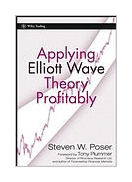|
||
• wydawnictwa polskie
• Zamów informacje o nowościach z wybranego tematu • kontakt
• Cookies na stronie |
APPLYING ELLIOT WAVE. THEORY, PROFITABLYPOSER Swydawnictwo: WILEY , rok wydania 2003, wydanie Icena netto: "I have always found
Elliott Wave difficult to understand and more difficult to apply, but finally Steve Poser
has written a book that makes sense and is born from real experience. This is not Elliott
made easy but Elliott that makes sense. Hats off to Poser for creating the book the
marketplace has needed for so long." "Steve Poser is one of
the few people I've met who can integrate Elliott Wave analysis into a normal conversation
on the markets and make sense." Numerous books have tried to capture the essence of Elliott Wave theory, but they either made Elliott more complicated than it needed to be, or, in an effort to overcome the perceived complexity of analysis using Elliott, oversimplified the process. In Applying Elliott Wave Theory Profitably, author and Elliott Wave expert Steven Poser takes a fresh approach to this proven trading strategy, giving you the most well-rounded and straightforward lesson on how to make money using Elliott Wave theory. Drawing from his many years of Elliott Wave experience, Poser: Explores how and why technical analysis works, and shows you where Elliott Wave theory fits into that picture; Reveals each of the basic and advanced patterns that the market might trace out and discusses the market conditions that typically produce these patterns; Outlines how to build an efficient trading plan; Illustrates how to continuously update your plan in real time as the market provides you with further information by way of a constant stream of prices, volume, and news; Examines how to review the market from multiple time frames, so you know what degree of price retracements to expect, as well as what your risks and rewards may be. Written in a clear, easy-to-understand manner, Applying Elliott Wave Theory Profitably is a thorough and essential resource for any trader looking to better understand a proven trading strategy and boost their bottom line. Steven W. Poser is President and founder of Poser Global Market Strategies Inc., an international stock, bond, and currency markets trading advisory firm. Mr. Poser publishes a daily newsletter, which covers these markets from a technical and fundamental perspective. He is also the Editor of The ETF Authority, which specializes in analysis of exchange-traded funds. Mr. Poser is an educator as well, and provides custom technical analysis training to individuals and corporations. He is regularly quoted by the financial press and has been a frequent guest on CNBC, CNNfn, and Reuters Financial Television. His clients include many of the largest institutional trading desks, mutual funds, and hedge funds, as well as a coterie of retail accounts. Table of Contents Foreword. Introduction. CHAPTER 1: Surfing Basics. The Basic Pattern. Investor Psychology and Sentiment. Psychological Basis for Technical Analysis and the Elliott Wave Theory. The Right Charts. The Basic Formations-Impulse Waves. The Basic Formations-Correction Waves. The Basic Formations-Wave Characteristics. The Contrary Opinion Trap. Sentiment and Technical Characteristics of Waves. Dow Theory and Elliott Wave Theory. The Fractal Nature of Price Movements. Impulse versus Correction and the Time Factor. Practical Pattern Recognition. Multiple Time-Frame Analysis. Summary. CHAPTER 2: Advanced Concepts. Complex Corrections. Elliott Wave and Classical Technical Analysis. Failed Fifth Waves. Summary. CHAPTER 3: Tsunami or Wavelet-Measurement Techniques. The Golden Ratio. Retracements. The Tendency of Alternation. Flats versus Zigzags. Triangles. Price Projections and Targ ets. Time Cycles. Fibonacci Day Counts. Summary. CHAPTER 4: Interlude-Does Elliott Work Outside of the Stock Market? Elliott Does Not Require Prices to Rise Forever. Explaining Rising Equity Market Prices: It's Not Just Inflation. The 1929-1942 Depression Era Triangle. Elliott Waves for All Markets. CHAPTER 5: Building an Elliott Wave Trading Plan. What Time-Frame Will You Trade? Know Your Risk Profile. Computer-Generated Wave Counts. Look at Your Potential Trade in Multiple Time-Frames. Get the Fundamental and Sentiment Pictures. Keep an Open Mind. Getting Started. Step 1: Preparation and Initial Research. Step 2: Long-Term Data Review. Step 3: Sharpen Your Time-Frame Focus. Step 4: Trading Time-Frame Analysis. Step 5: Review Charts One Time-Frame Lower. Step 6: The Details. Step 7: Monitoring. Summary. CHAPTER 6: Tying It All Together. The Bubble Bursts: Intel Corporation. The Dollar and the Yen. Hot Chocolate. Day Trading with Elliott. Summary. CHAPTER 7: The Psychology of an Elliott Wave-Based Trader. Trading and Analysis Are Two Different Things. Know the Psychology of Indicators. Control Your Emotions. Knowledge and Intelligence Are Necessary But Not Sufficient for Good Trading. Separate Yourself from the Crowd. Trading Systems. Understand Why You Are Placing an Order. Understand What You Trade-The Charts Are Not Enough! Don't Forget Your Wave Characteristics-Make Sure Your Counts Are Consistent with Market Sentiment. Summary. CHAPTER 8: Future Waves. But You're a Technical Analyst-Why All the Economics? The State of the World-2003. Whence the Dollar. Japan's Bear Market Ends. Notes. Index. 222 pages Księgarnia nie działa. Nie odpowiadamy na pytania i nie realizujemy zamówien. Do odwolania !. |


